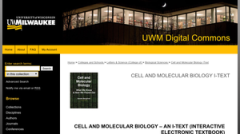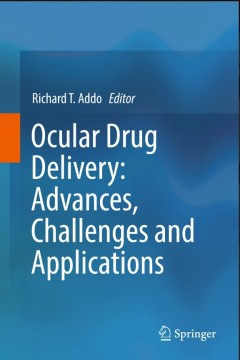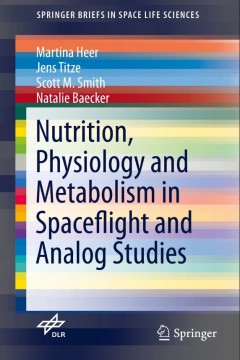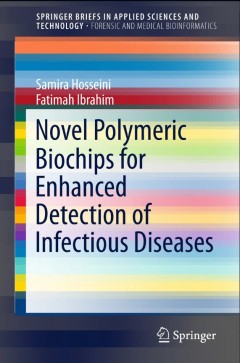Filter by

The Serpin Family Proteins with Multiple Functions in Health and Disease
The book provides an comprehensive overview on biology, genetics and cellular functions of serpins (serine protease inhibitors) in health and disease. With over 1000 members serpins are the most diverse family of protease inhibitors. Latest groundbreaking research findings are presented and broaden the understanding on inhibitory and non-inhibitory serpins, not only in mammalian organisms but a…
- Edition
- -
- ISBN/ISSN
- 978-3-319-22711-5
- Collation
- -
- Series Title
- -
- Call Number
- -

Cell and Molecular Biology : What We Know & How We Found Out
Overview: Like most introductory science textbooks, this one opens with a discussion of scientific method. A key feature is its focus on experimental support for what we know about cell and molecular biology. Understanding how science is practiced and how investigators think about experimental results is essential to understanding the relationship of cell structure and function…, not to menti…
- Edition
- -
- ISBN/ISSN
- -
- Collation
- -
- Series Title
- -
- Call Number
- 570 BER c

The Science of Human Evolution Getting it Right
This textbook provides a collection of case studies in paleoanthropology demonstrating the method and limitations of science. These cases introduce the reader to various problems and illustrate how they have been addressed historically. The various topics selected represent important corrections in the field, some critical breakthroughs, models of good reasoning and experimental design, and im…
- Edition
- -
- ISBN/ISSN
- 978-3-319-41585-7
- Collation
- -
- Series Title
- -
- Call Number
- -

Flight of Mammals: From Terrestrial Limbs to Wings
This book offers a new explanation for the development of flight in mammals and offers detailed morphological descriptions of mammals with flapping flight. The skeletomuscular apparatus of the shoulder girdle and forelimbs of tree shrews, flying lemurs and bats is described in detail. Special attention is paid to the recognition of peculiar features of the skeleton and joints. For the basic loc…
- Edition
- -
- ISBN/ISSN
- 978-3-319-08756-6
- Collation
- XXVII, 303 hlm.
- Series Title
- -
- Call Number
- -

Oncodynamics : Effects of Cancer Cells on the Body
This volume will introduce new terminology to the field of oncology, subdividing it into oncokinetics—the mechanics of the tumor cells as they arise and spread throughout the body—and oncodynamics—the impact of abnormal cues generated by tumors on the physiological functioning of the body. The volume will outline the importance of oncodynamics from both a cancer patient’s and a caregive…
- Edition
- -
- ISBN/ISSN
- 978-3-319-28556-6
- Collation
- XIV, 215 halaman
- Series Title
- -
- Call Number
- 616 ONC

Ocular Drug Delivery: Advances, Challenges and Applications
The eye is a computerized system that has been designed for self-defense, and these defense mechanisms create challenges in administration of medications to the eye. Therefore, ocular drug delivery has been a major challenge to drug delivery researchers. There are on-going studies, in search of treatment especially for the diseases affecting the posterior segment of the eye. This book gives an…
- Edition
- 1
- ISBN/ISSN
- 978-3-319-47689-6
- Collation
- XIII, 185
- Series Title
- -
- Call Number
- -

Nutrition, Exercise and Epigenetics: Ageing Interventions
This book focuses on the three most important aspects of ageing research: nutrition, physical exercise and epigenetics. The contributors discuss ways that age-related epigenetic imprints such as DNA methylation and histone acetylation are modified by these two interventions. The emphasis on epigenetics helps to illuminate the underlying mechanisms of anti-ageing interventions, as ageing and dis…
- Edition
- 1
- ISBN/ISSN
- 978-3-319-14829-8
- Collation
- VIII, 278
- Series Title
- Healthy Ageing and Longevity
- Call Number
- -

Nutrition Physiology and Metabolism in Spaceflight and Analog Studies
This book provides an overview of microgravity-induced changes in human metabolism, muscle, bone and the cardio-vascular system, and discusses in detail the nutrient uptake required during spaceflight to counteract these adaptive mechanisms and ensure an improved physical constitution upon returning to Earth. It addresses the needs of professors, researchers and students working in the field of…
- Edition
- 1
- ISBN/ISSN
- 978-3-319-18520-0
- Collation
- XIII, 69
- Series Title
- SpringerBriefs in Space Life Sciences
- Call Number
- -

Numerical Mathematics and Advanced Applications ENUMATH 2015
The European Conference on Numerical Mathematics and Advanced Applications (ENUMATH), held every 2 years, provides a forum for discussing recent advances in and aspects of numerical mathematics and scientific and industrial applications. The previous ENUMATH meetings took place in Paris (1995), Heidelberg (1997), Jyvaskyla (1999), Ischia (2001), Prague (2003), Santiago de Compostela (2005), Gra…
- Edition
- 1
- ISBN/ISSN
- 978-3-319-39927-0
- Collation
- XIV, 643
- Series Title
- Lecture Notes in Computational Science and Engineering
- Call Number
- -

Novel Polymeric Biochips for Enhanced Detection of Infectious Diseases
This book focuses on the creation and development of polymeric platforms (different compositions) from a specific polymer system. This system can be used as an adaptive technique for producing sensitive analytical devices, or for simple integration into existing bioanalytical tools in order to enhance the detection signal.
- Edition
- 1
- ISBN/ISSN
- 978-981-10-0106-2
- Collation
- XII, 55
- Series Title
- SpringerBriefs in Applied Sciences and Technology
- Call Number
- -
 Computer Science, Information & General Works
Computer Science, Information & General Works  Philosophy & Psychology
Philosophy & Psychology  Religion
Religion  Social Sciences
Social Sciences  Language
Language  Pure Science
Pure Science  Applied Sciences
Applied Sciences  Art & Recreation
Art & Recreation  Literature
Literature  History & Geography
History & Geography